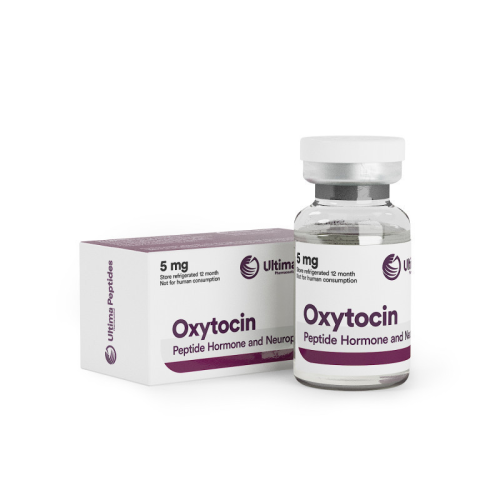Ultima-Oxytocin 5mg
- Brand: Ultima Pharmaceuticals - US
- Product Code: Ultima-Oxytocin 5mg
- Availability: In Stock
-
$61.00
MANUFACTURER
Ultima Pharmaceuticals - US
WAREHOUSE
USA Warehouse 5
SUBSTANCE
Oxytocin
,
Oxytocin is a hormone produced by the posterior lobe of the pituitary gland, a small gland located at the base of the brain.
Commonly referred to as the "cuddle hormone" or "love hormone," oxytocin is released during moments of physical closeness or social bonding. According to a 2009 study published in the journal , activities as simple as playing with your dog can trigger a release of oxytocin. However, these names may be somewhat misleading.
Hormones and BehaviorOxytocin can also heighten memories of negative bonding experiences, particularly in situations where men have difficult relationships with their mothers. Furthermore, it may lead to increased suspicion of individuals perceived as outsiders. Hence, the effects of oxytocin—whether it fosters warmth or breeds distrust—largely depend on the surrounding context.
Oxytocin in WomenOxytocin is especially vital for women. "Oxytocin is a peptide manufactured in the brain that was initially noted for its role in childbirth and breastfeeding," stated Larry Young, a behavioral neuroscientist from Emory University in Atlanta, Georgia.
The hormone triggers uterine contractions during labor and aids in the shrinking of the uterus post-delivery. When an infant suckles, it stimulates the release of oxytocin, prompting the mother's body to release milk.
Oxytocin also fosters the bonding between mother and child. Research indicates that "female rats experience aversion to their pups before giving birth," according to Young. "However, after giving birth, their brains change, leading them to find the pups irresistible." Similar patterns have been observed in humans.
A 2007 study in noted that mothers with higher oxytocin levels during the first trimester of pregnancy were more likely to display bonding behaviors, such as singing to or bathing their babies. Though maternal bonding is not always innate—considering that humans can adopt and nurture children—oxytocin during pregnancy "appears to play a role in the motivation to connect with a baby," Young explained. Additionally, studies show that when mothers interact with their infants, the babies' levels of oxytocin also rise.
Psychological ScienceOxytocin in MenIn men, oxytocin also aids bonding. A 2012 study found that fathers who received oxytocin via nasal spray engaged more closely with their 5-month-old babies than those who did not. (In men, another hormone known as vasopressin plays a more significant role.)
This anti-social aspect of a typically social hormone adds complexity to the narrative around oxytocin. One study revealed that Dutch students who inhaled the hormone became more favorable towards Dutch characters but exhibited negative attitudes towards characters with Arab or German names. This suggests that oxytocin's social bonding effects may be directed primarily towards individuals perceived as part of one’s in-group, as reported in January 2011 in .
PNASAnother study published in in 2010 found that men who inhaled oxytocin while reflecting on their mothers were more likely to describe their moms as caring if they had secure relationships. Conversely, those with troubled relationships viewed their mothers as less caring. This shows that oxytocin may enhance the encoding of social memories, reinforcing prior associations, whether positive or negative.
PNAS"My perspective on oxytocin's role in the brain is that it enhances the relevance of social information," Young stated. "It connects brain regions involved in processing social cues—like visuals, sounds, or scents—to the brain's reward centers."
Oxytocin Sprays and Side EffectsResearchers are also exploring oxytocin nasal sprays as potential treatments for autism. Given that autism can hinder social abilities, a small study published in in 2013 administered the hormone to children and teens with the disorder and asked them to identify emotions based on images of people's eyes.
PNASThe results showed no improvement in emotion recognition post-oxytocin exposure; however, brain regions linked to social interactions were activated. This suggests that oxytocin could potentially support behavioral therapy for kids with autism.
"When considering the use of oxytocin for conditions like autism, it's crucial to provide it in contexts with positive social interactions," Young noted.
The use of oxytocin sprays outside of medical settings remains ambiguous. While some online products claim to ease stress and enhance social interactions, they lack FDA regulation, leaving their effectiveness, side effects, and even their actual oxytocin content unknown.
There are no extensive studies on the long-term effects of legitimate oxytocin sprays used in research, with most studies administering just a single dose of the hormone. Pitocin, a synthetic oxytocin version used intravenously to induce labor, can lead to side effects such as nausea, vomiting, and abdominal pain.

